Search Engine Journal been documenting the search marketing industry for the past 10 years. To commemorate this milestone, Loren Baker, founder of SEJ, got in the time machine with me and travelled back to 2003: the year of SEJ’s inception.
 Loren Baker’s got Halloween in the bag this year
Loren Baker’s got Halloween in the bag this yearAugust 2003: “Google Adds Google News Alerts”
Getting its start with a simple blue layout on a Blogger blog, SEJ even had a Yahoo! Group and some .gif banner ads on its sidebar. Pretty fancy.
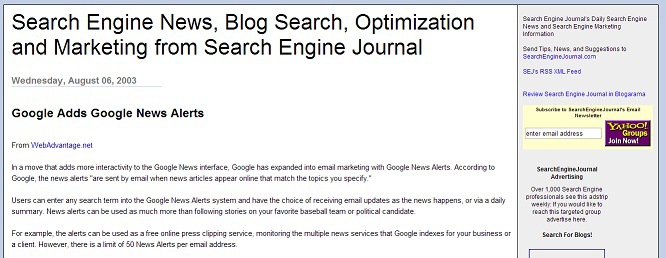
Kelsey “Young Gun” Jones: I still believe that Google Alerts is a relevant tool today for monitoring an online presence for clients (and yourself) as well as find industry results for blog post ideas. When Google Alerts launched, did you think it would be still so relevant today?
Loren “O.G.” Baker: I wasn’t a big fan of the original Google Alerts and still am not because I really don’t care about documents that are indexed in Google as a whole. The addition to Google Alerts to Google News at the time was a pretty big deal because brands and companies could get more instant alerts on themselves and their competition in the realtime results of news, versus waiting sometimes up to 30 days for Google to refresh it’s index (I remember the nights of waiting up until 3 am on the 31st to see Google roll out their index and ranking updates for the next month). This in many ways was a precursor to things like fresh and instant results, date stamping, Google Search Tools and other dynamic options that are commonplace on the web.
Back in 2003, Google was more or less a static search engine, but Google News was a dynamically engineered and totally different part of Google search, running off of instant crawls that would update about 10 minutes after a piece of content was published and added to a site’s HTML news feed. Nowadays, the Google Index itself will update in less than a minute depending on the authority of a site.
September 2003: “Google and Lycos Partner on AdWords”
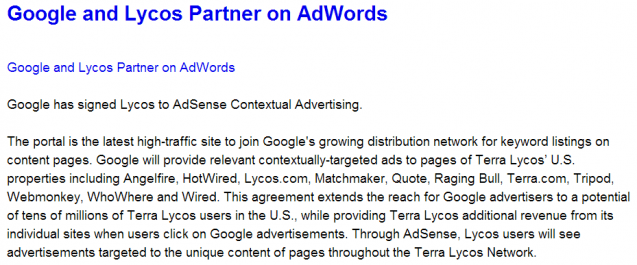
KJ: AltaVista was my favorite search engine/portal back in the day. Whatever happened to Lycos? Back in 2003, did you ever think Lycos would be obsolete and SEs like Yahoo! would still be relevant? Also, I want to still think Ask is relevant. Do you agree or am I just too sad to let Jeeves go?
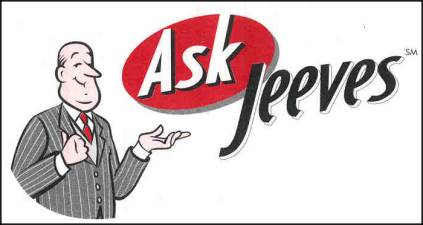
LB: The biggest loss in Ask Jeeves / Ask.com has been the shelving of the Teoma search technology. Ask Jeeves was built off of the search philosophy that the engines are now struggling with; the ability to serve relevant results to natural human language queries. They were also the pioneer in universal search as well as intent based query serving. Ask Jeeves and NorthernLight (with their Blue Folders … I’m really dating myself here) were my favorite go-to search engines for actually finding information.
Lycos, like Excite and Yahoo at the time, was more of a portal with a search engine. They tried to diversify the way in which they served their results when they launched HotBot, but that never really caught on. AltaVista on the other hand is the classic example of a giant shooting itself in the foot. AltaVista used to be Google … until the pressure of selling ads got to them and they decided over the course of a month (there was actually a count down) to become a copy of Excite or Lycos. Imagine what would have become of Altavista if they had been the ones to strike the search deal with Yahoo! (the company that ironically bought their technology) instead of Google. We’d all be “AVing” today. The funny thing was, after AltaVista cut off their own legs with the portal transition, they ended up launching Raging.com; their answer to Google, which was basically the old AltaVista. It’s the classic New Coke story, except AltaVista made a worse decision.
So no, I didn’t think portals would die so quickly, but if a portal doesn’t do anything that makes it special, it’s an instant death sentence. That almost happened to Yahoo! when internal fighting led to them never launching a competing social network. I’ve said for years that My.Yahoo! should have been their Facebook, but they were so fragmented internally that the only things they got off the ground were copycats like Yahoo! 360, which imploded rather quickly. But Yahoo had search and email .. and acquired the company that invented search advertising … which kept them going. Lycos on the other hand had nothing, and lost the war on both fronts.
November 2003: ‘Google Update’ Announced
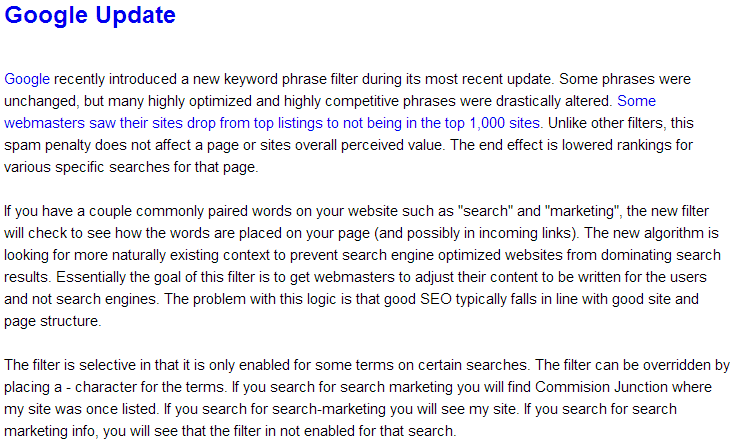
KJ: Ahh, the good ‘ol days, where we didn’t name every Google algorithm update. I had no idea that Google was already working on combating nefarious keyword search strategies.
When this update happened, what were your thoughts? Did it cause you to change anything about your existing strategies?
LB: This was actually a reprint of Aaron Wall’s post form search-marketing.info, which is a site I use in many presentations backing my theory that TLD’s don’t matter as much if a strong brand, personality and thought process are behind the site. That being said, yeah, this was one of the first updates that built up to the dreaded Google Florida update and future updates. Did it change the way people did SEO? Not as much at the time and it really took Google 8 more years to get it right with Panda & Penguin, but this was one of the first dominos to fall.
Like Aaron, I was practicing authority building and content marketing back in 2003, so my clients and I weren’t that affected, but many spammers and jammers were 🙂
December 2003: “Google #1 Search Engine for Business Users”
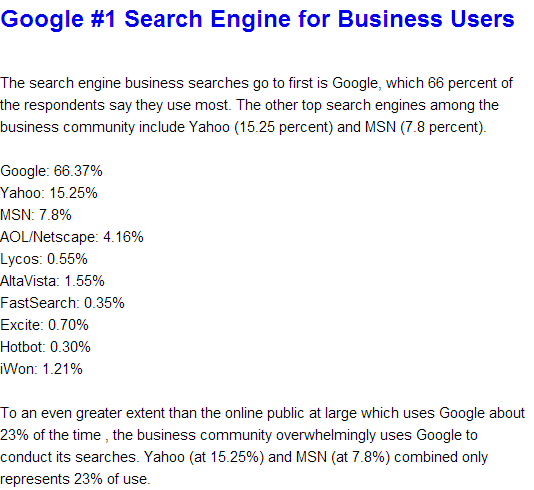
KJ: Google grew fast, first getting notoriety for business searches. As of April 2013, Google owned over 66% of the total search market. Google says the following about its search traffic today: “Every day Google answers more than one billion questions from people around the globe in 181 countries and 146 languages. 15% of the searches we see everyday we’ve never seen before.”
In 2003, where did you see Google heading?
LB: Out of all these posts, this is probably one of the more important blasts from the past. In 2003, Google was relatively young and the browser market was still dominated by Internet Explorer. Search was just an extension of the internet dial-up plan, daily homepage or email destination. So Google was really not as much of a player on the consumer side of things as it was on the business and academic side of things. There was no real Google Shopping offering, listings were 10 blue links and for the most part, consumers depended upon the shopping and comparison engines that dominated at the time and have since been devoured by Google. Yahoo Shopping was a top destination, as were services like Pricegrabber and MySimon.
The mindset of the consumer has changed dramatically over the past decade and my belief is that the current everyday user has the same scrutiny in their searching as the researcher did in 2003… users scroll; hence the popularity of being #9 or #10 in the results now … versus the race to be #1 a decade ago.
December 2003: “Google IPO and Google’s Future”
As one CEO puts it, “My take is that they are crumbling under the weight of their own success.” Says an investor, “Google has a lot of momentum, but its current position is probably not defensible.”
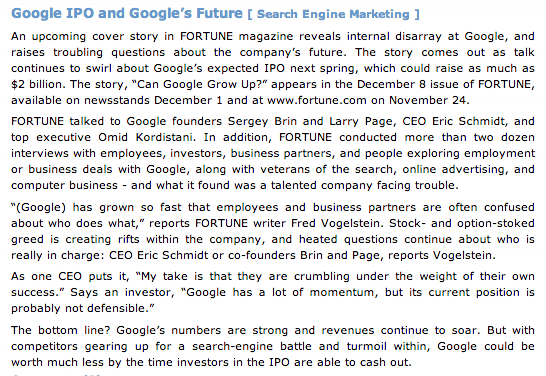
KJ: Who knew Google had all this drama? Still, I’m sure all great companies have some growing pains. What are your thoughts on Google’s IPO back in 2003?
LB: I should have bought at $80 a share 🙁
December 2003: “Google’s New Search Algorithm – SEO people up in arms”
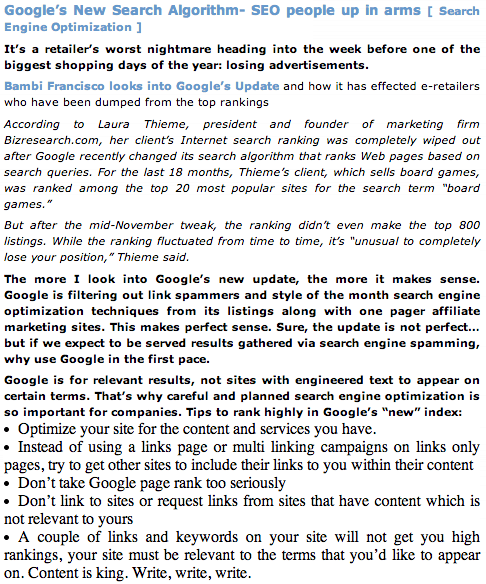
KJ: I probably see a “Content is king” post once a week today (and have probably written some myself). What bothered me most about the SEO industry when I got into it was how obsessed people were with ‘gaming’ Google and other search engines. It’s good to know you were white hat from the beginning, Loren. 🙂
LB: The funniest thing about the tips in this post is that people are still preaching them as innovative today! Look at the list: relevancy, importance of content and links to that content, optimizing the website for technical and content purposes and actually building links within content. Anyone could present this list tomorrow at a search conference and people would be nodding their heads and taking notes.
What else was happening in the world in 2003:
- The iTunes Store debuted and was named TIME Magazine’s Invention of the Year.
- #1 selling cellphone: the Nokia 1100. iPhone who?
- Camera phones were introduced. KJ: Remember how cool you felt when you got a phone with a colored screen?
- The Concorde jet made its last flight.
- #1 movie release: The Lord of the Rings, The Return of the King.
SEJ peeps: Where were you in 2003? Where did you see search heading?
BONUS Question: What was your favorite search engine in 2003?
Get in the DeLorean with us next Thursday when we go back in time to 2004: when the Hubble telescope confirmed the oldest known planet (13 billion years young), Lance Armstrong won an unprecedented 6th consecutive Tour de France, and a gallon of gas was $2.10.




